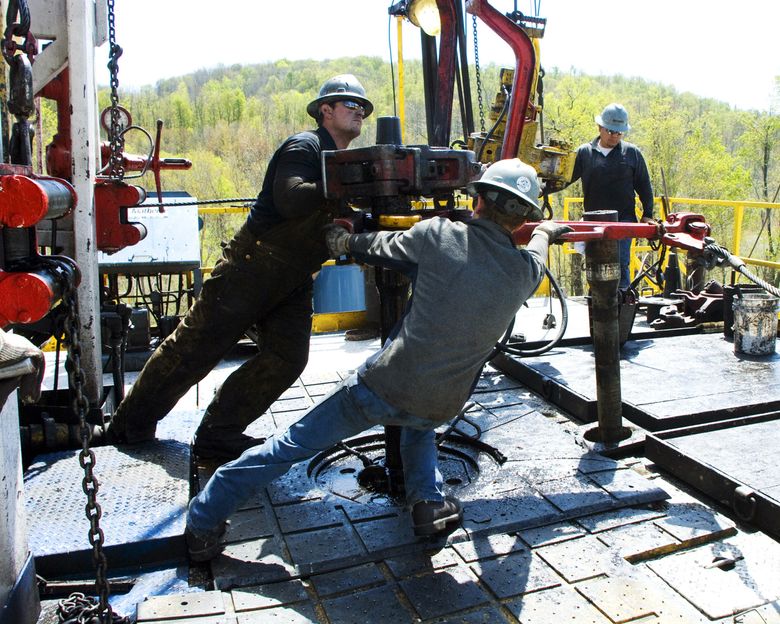The Seattle Times Opinion
Switching from coal to natural gas will not save our planet
 Workers move a well casing at a Chesapeake Energy natural gas well site near Burlington, Pa. (Ralph Wilson / The Associated Press)
Workers move a well casing at a Chesapeake Energy natural gas well site near Burlington, Pa. (Ralph Wilson / The Associated Press)
Bill McKibben, Special to The Times August 8, 2017
If as little as 3 percent of natural gas leaks in the course of fracking and delivering it to the power plant through a pipe, then it’s worse than coal.
MOST magic tricks and confidence games mostly work the same way — a little bit of misdirection to get the audience looking in the wrong direction. And some of the finest magicians at large in America today are its natural-gas salesmen, who have worked hard to reassure us that they’re part of the solution to the global warming crisis. To understand why that’s a ploy — to understand why they’re in fact helping drive the heating of the planet — you have to pay close attention.
The basic move is to insist that natural gas helps cut carbon emissions. Indeed, as Dan Kirschner, the head of the Northwest Gas Association, put it in his recent Op-Ed [“The power of natural gas in the war on carbon emissions,” Aug. 3, Opinion], “the U.S. leads the world in absolute reductions in carbon emissions, due in large part to the increased availability and affordability of natural gas.”
This is true on the surface. As America’s power plants have replaced coal with fracked gas, carbon emissions have fallen because natural gas produces half as much CO2 as coal when you burn it. The problem is, carbon emissions are not the only thing that drive global warming. There’s another gas that does the job even more powerfully: CH4, or methane, which is the scientific name for natural gas. If it leaks unburned into the atmosphere, then methane traps heat about 80 times more effectively, molecule for molecule, than CO2. The point of this chemistry lesson is: If as little as 3 percent of natural gas leaks in the course of fracking and delivering it to the power plant through a pipe, then it’s worse than coal.
And, sadly, it’s now clear that leakage rates are higher than that. In January 2013, aerial surveys of a Utah fracking basin, for instance, found leak rates as high as 9 percent. Data from a Harvard satellite survey showed that between 2002 and 2014, U.S. methane emissions increased more than 30 percent.
In fact, some experts who have reviewed the data say that because of the boom in fracking and the conversion to gas, America’s total greenhouse-gas emissions may actually have gone up during the Obama years. And at least the Obama administration required drillers to keep track of how much methane they were leaking — one of the first acts of the Trump EPA was to scrap that requirement, apparently on the grounds that what you don’t know can’t hurt you.
So, to summarize, because this is a subtle point that citizens, politicians and editors need to understand, given the importance of the debate: Natural gas is not reducing the amount of greenhouse-gas emissions. It is doing nothing to slow climate change.
And worse, it’s making it much harder to take the steps that really would matter. As we get off coal because of the way it drives climate change, what we should be doing is moving to renewable energy. Solar power emits no carbon at all, which makes it the natural choice. But as long as we have cheap natural gas flooding the market, we’ll move more slowly in the direction of real renewables. Cutting greenhouse-gas emissions by burning natural gas is like dieting by eating reduced-fat cookies, explained the principal investigator of a Stanford forum that studied the explosive growth in natural gas: “If you really want to lose weight, you probably need to avoid cookies altogether.”
Which is truly sad, because the solar panel is the great have-your-cake-and-eat-it technology of all time — the real deal. It takes the power the sun sends us every day and turns it into electricity. There’s no catch, no con. It’s our Houdini escape route from climate change — but only if we catch on in time to the tawdry little three-card-monte game the fossil-fuel industry is running.
Bill McKibben is the Schumann distinguished scholar in Environmental Studies at Middlebury College and founder of the global climate campaign 350.org.
